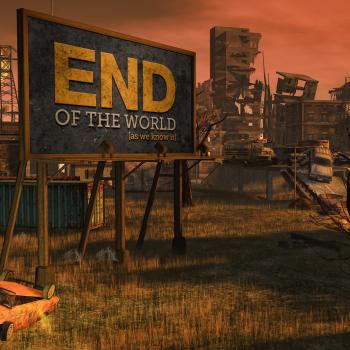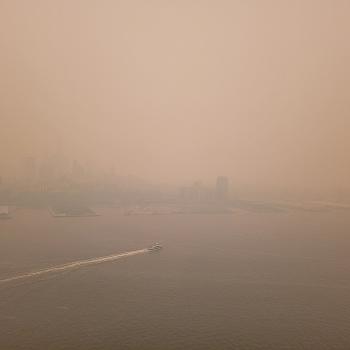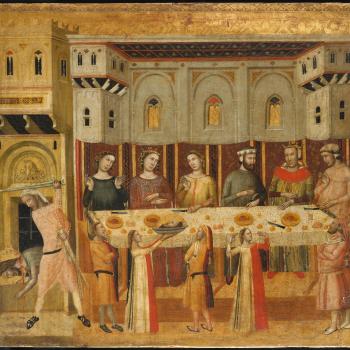
The prophet Amos, a goatherd touched by the spirit of God, felt God’s pathos as he saw the way the poor and vulnerable were not only neglected, but abused by those with money and power. He cried out: “Woe to those who are at ease in Zion, and to those who feel secure on the mountain of Samaria, the notable men of the first of the nations, to whom the house of Israel come!” (Amos 6:1 RSV). Amos indicated that those who lived on the lives of others, those who lived a life of luxury, relying upon others so that they can maintain that life of luxury for themselves, would find that such a lifestyle came at a high cost. They would eventually be looked upon by others who saw their luxury and wealth and would come and take it from them, just as they had taken it from others:
“Hear this word, you cows of Bashan, who are in the mountain of Samaria, who oppress the poor, who crush the needy, who say to their husbands, `Bring, that we may drink!’ The Lord GOD has sworn by his holiness that, behold, the days are coming upon you, when they shall take you away with hooks, even the last of you with fishhooks. And you shall go out through the breaches, every one straight before her; and you shall be cast forth into Harmon,” says the LORD (Amos 4:1-3 RSV).
The message of Amos remains valid today. Social injustice, systematic evil, can last only so long before the whole system breaks down. Those who take advantage of others will find that they will likewise be taken advantage on another day. They might not be taken away into other lands, but they will find their own land taken from them, and this will come as a result of evil which they allowed. The prophets could sense this. They understood what happens when evil goes unabated. They constantly warned the people of Israel what was going to happen: if they do not follow what was right and just, they would experience the effects of the injustice which overshadowed the land on which they lived as of result of what they have done.
It is common for those with great wealth, those who enjoy extreme luxury, to be blinded by it. They hide from themselves the suffering and injustices which are around them, so then they can ignore the fact that they are the cause of pain and sorrow for others. Thus, St. Cyril of Alexandria, discussing the warnings of Amos to the people of Samaria, explains:
He severely accuses the more prominent people in Samaria, who took pride in wealth greater than that of others, of being under the influence, as it were, of great prosperity and so distracted by the extent of the luxury as to have no suspicion at all of the disasters, or not to think that the God of all was ever provoked by people with this attitude and would inflict punishment on those given to sin. [1]
What Amos said should be seen as a warning to us as well. We must not become prideful of our own prosperity, especially if our prosperity employs systematic sin to give the benefits of that prosperity to a few at the expense of many others. The message of Amos, the warning of Amos, is universal, though he spoke to the people of his time. Sadly, the simple goatherd went unheeded in his day, and he continues to go unheeded today. Systematic injustice, far from being dismantled, has been encouraged, by many who claim to love and obey God. Did they not hear what God said through Amos?
“I hate, I despise your feasts, and I take no delight in your solemn assemblies. Even though you offer me your burnt offerings and cereal offerings, I will not accept them, and the peace offerings of your fatted beasts I will not look upon. Take away from me the noise of your songs; to the melody of your harps I will not listen. But let justice roll down like waters, and righteousness like an ever-flowing stream (Amos 5:21-24 RSV).
So long as we promote and accept injustice, so long as we let our prosperity and a luxurious way of life get in the way of justice, our worship of God is reprehensible, because there can be no true worship of God without the promotion of justice. If we want to come together and worship God, to enter into a communion of love with God, we must likewise go out into the world and promote justice. We must do what we can to dismantle systematic injustice and make sure those who suffer at the hands of injustice receive what they need in order to be healed. We truly must let justice roll down like waters, cleansing the land of injustice, so that the purity of justice can flow through the land, giving the land what it needs in order to sustain itself and the people who live upon it. But we cannot do this if we are complacent, as Pope Francis, reflecting upon the writings of Amos, tells us:
“Woe to the complacent in Zion, to those who feel secure … lying upon beds of ivory!” (Am 6:1,4). They eat, they drink, they sing, they play and they care nothing about other people’s troubles.
These are harsh words which the prophet Amos speaks, yet they warn us about a danger that all of us face. What is it that this messenger of God denounces; what does he want his contemporaries, and ourselves today, to realize? The danger of complacency, comfort, worldliness in our lifestyles and in our hearts, of making our well-being the most important thing in our lives. This was the case of the rich man in the Gospel, who dressed in fine garments and daily indulged in sumptuous banquets; this was what was important for him. And the poor man at his doorstep who had nothing to relieve his hunger? That was none of his business, it didn’t concern him. Whenever material things, money, worldliness, become the centre of our lives, they take hold of us, they possess us; we lose our very identity as human beings. Think of it: the rich man in the Gospel has no name, he is simply “a rich man”. Material things, his possessions, are his face; he has nothing else.[2]
Those of us who live in prosperity must not let that prosperity get the best of us. We must examine our lives. We must do what we can to make sure we do not ignore the cry of the poor, the vulnerable, the oppressed. Did we gain our prosperity at their expense? We will eventually find the bill for our luxury will come due. We should do what we can now to pay it off, to promote justice now, or else, we will find the debt will grow, and the bill will be much greater later, until at last, it will be so great, the system which created the evil will self-destruct, and those who supported that evil will suffer the greatest at the hands of those who create and establish the next system which comes into place.
[1] St. Cyril of Alexandria, “Commentary on Amos” in Commentary on the Twelve Prophets: Volume 2. Trans. Robert C. Hill (Washington, DC: CUA Press, 2008), 88.
[2] Pope Francis, “Holy Mass On the Occasion of the ‘Day for Catechists’ During the Year of Faith” (9-29-2013). Vatican translation.
Stay in touch! Like A Little Bit of Nothing on Facebook.
If you liked what you read, please consider sharing it with your friends and family!













